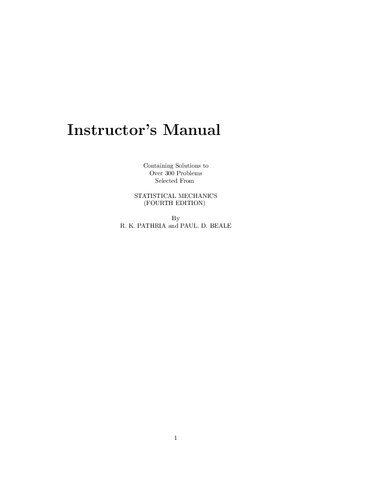

Most ebook files are in PDF format, so you can easily read them using various software such as Foxit Reader or directly on the Google Chrome browser.
Some ebook files are released by publishers in other formats such as .awz, .mobi, .epub, .fb2, etc. You may need to install specific software to read these formats on mobile/PC, such as Calibre.
Please read the tutorial at this link: https://ebookbell.com/faq
We offer FREE conversion to the popular formats you request; however, this may take some time. Therefore, right after payment, please email us, and we will try to provide the service as quickly as possible.
For some exceptional file formats or broken links (if any), please refrain from opening any disputes. Instead, email us first, and we will try to assist within a maximum of 6 hours.
EbookBell Team

4.3
68 reviewsMain subject categories: • Solutions manual • Statistical mechanics • Thermodynamics • Mathematical physics • Mathematical Modelling
Statistical Mechanics, Fourth Edition, explores the physical properties of matter based on the dynamic behavior of its microscopic constituents. This valuable textbook introduces the reader to the historical context of the subject before delving deeper into chapters about thermodynamics, ensemble theory, simple gases theory, Ideal Bose and Fermi systems, statistical mechanics of interacting systems, phase transitions, and computer simulations. In the latest revision, the book's authors have updated the content throughout, including new coverage on biophysical applications, updated exercises, and computer simulations. This updated edition will be an indispensable to students and researchers of statistical mechanics, thermodynamics, and physics.
• Retains the valuable organization and trusted coverage of previous market-leading editions
• Includes new coverage on biophysical applications and computer simulations
• Offers Mathematica files for student use and a secure solutions manual for qualified instructors
• Covers Bose-Einstein condensation in atomic gases, Thermodynamics of the early universe, Computer simulations: Monte Carlo and molecular dynamics, Correlation functions and scattering, Fluctuation-dissipation theorem and the dynamical structure factor, and much more